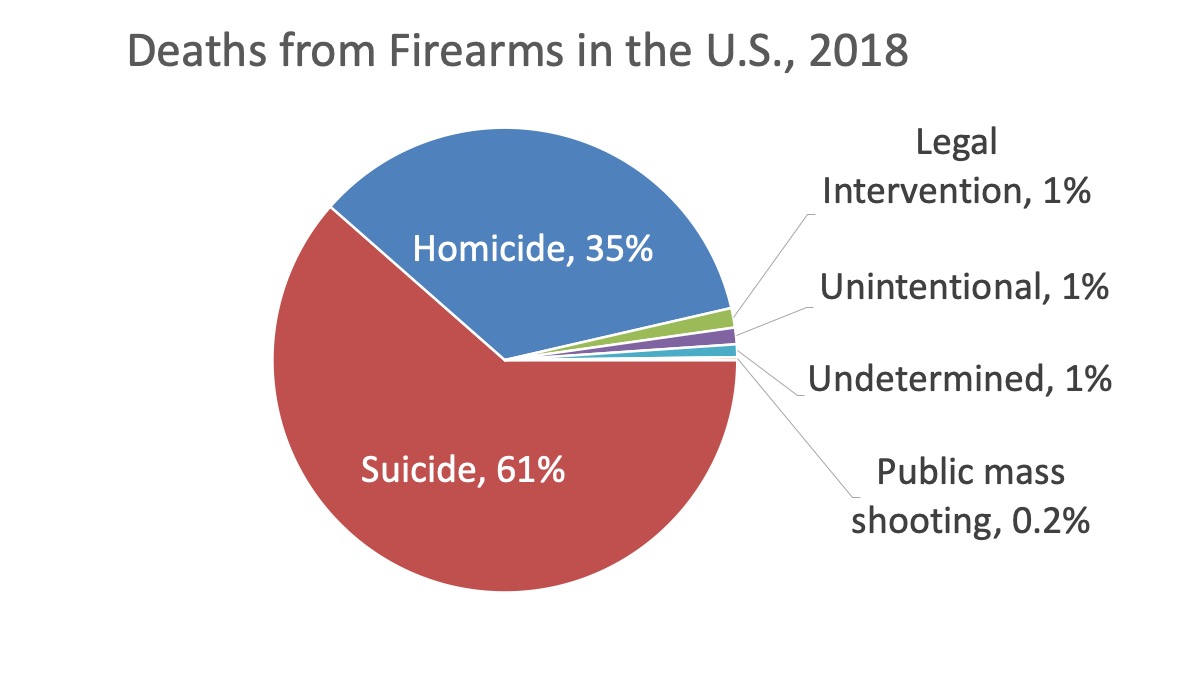but wouldn't you agree that the gun argument is similar to your other moral arguments in another thread about pushing the fat guy on a track to save 5 others
Sort of. If you could ban all guns (which isn't possible) and save 5 lives by losing 1 (say, to someone who would be stabbed in a fight because he didn't have a gun) that would be a somewhat similar case, with a similar set of tradeoffs.
The US already has a gun culture, many, many guns, they aren't going to go away under any circumstances . . .
The US had a smoking culture, popularized in movies, magazines and newspapers. And tobacco companies made several similar arguments - that it's not bad for you, that doctors recommend it, that it's too entrenched in our culture to go away. But it did, because we as a people decided they were killing too many people. Since the 1970's tobacco use has declined by more than a factor of 3. Deaths have dropped by almost half, but that of course is a lagging indicator. And it is worthwhile to note that this was accomplished without banning tobacco. We now have laws that restrict where you can smoke, how old you have to be to smoke, where you can advertise etc but tobacco itself is still legal, and tobacco companies are still trying to figure out new ways to get tobacco into people. But overall they are losing.
We can do something similar with firearms.
and even if many law abiding people turned in their guns (they won't) every criminal would still be loaded to the gills and that wouldn't make anything better.
Other countries have done it - and it worked.
We have made one (poor) attempt at it with the assault weapon ban of 1994. And even though it was poorly thought out, crimes with assault weapons DID decline. Overall it didn't do that much because people modified other weapons (extended magazines etc) to perform the same function. That is evidence that banning a certain type of weapon does indeed reduce the use of that sort of weapon - but it has to be well written.
Also it is a mistake to assume that criminals loaded to the gills, with intent to kill, are the big risk to an average American. Look at the last ten mass murders, taken from Wikipedia's list of mass shootings in the US.
Yakima shooting - the shooter, Jarid Haddock, had no criminal record - just a semiauto handgun and a lot of ammo.
Half Moon Bay shooting - the shooter, Chunli Zhao, was a disgruntled worker with no criminal record.
Monterey Park shooting - the perpetrator, Huu Can Tran, had one previous arrest for illegal possession of a firearm with no other arrests. No conviction. There was no apparent reason for the shooting but he did appear mentally disturbed beforehand.
Goshen shooting - two suspects arrested. No clear motive yet but it may be related to gang activity.
Enoch shooting - a man killed his family and himself. No criminal record although he had been investigated for domestic abuse allegations, and his wife was seeking a divorce.
Chesapeake WalMart shooting - a WalMart employee with no criminal record shot several people at WalMart then killed himself. He left a note with allusions to Satan and being mocked at work.
Colorado Springs - Anderson Lee Aldrich shot up a nightclub. He had one arrest previously for "taking his grandparents hostage" but was not convicted of anything.
University of Virginia shooting - Christopher Darnell Jones Jr shot and killed several other students. He had no criminal record, although he had been under investigation for possibly having a gun at school.
St Louis shooting - Orlando Harris shot and killed three schoolkids. No criminal record. He was being treated for mental illness. He tried to buy a gun from a dealer but failed the FBI background check. He then bought one from a private individual. His mother was horrified when she heard this and called the police. The police came, but said that he had broken no laws, so they could not take the AR-15 from him.
https://en.wikipedia.org/wiki/List_of_mass_shootings_in_the_United_States
Of those ten, only one has any possible connection to those "criminals loaded to the gills." The rest were just people, not criminals, who snapped for one reason or another, had a gun available right there, and started shooting. These are the shootings that tougher gun laws will stop. It will not solve the problem 100% of course - but reducing shootings by 90% would be a pretty good outcome.
To me it's that lack of balance that results in Seattle of today or hoping to absolutely remove all guns from the U.S. In reality, it's not even a desirable outcome in the extreme.
I agree. But if we could get the ratio of guns to people down to (say) the ratio in Australia it would do a lot of good.

